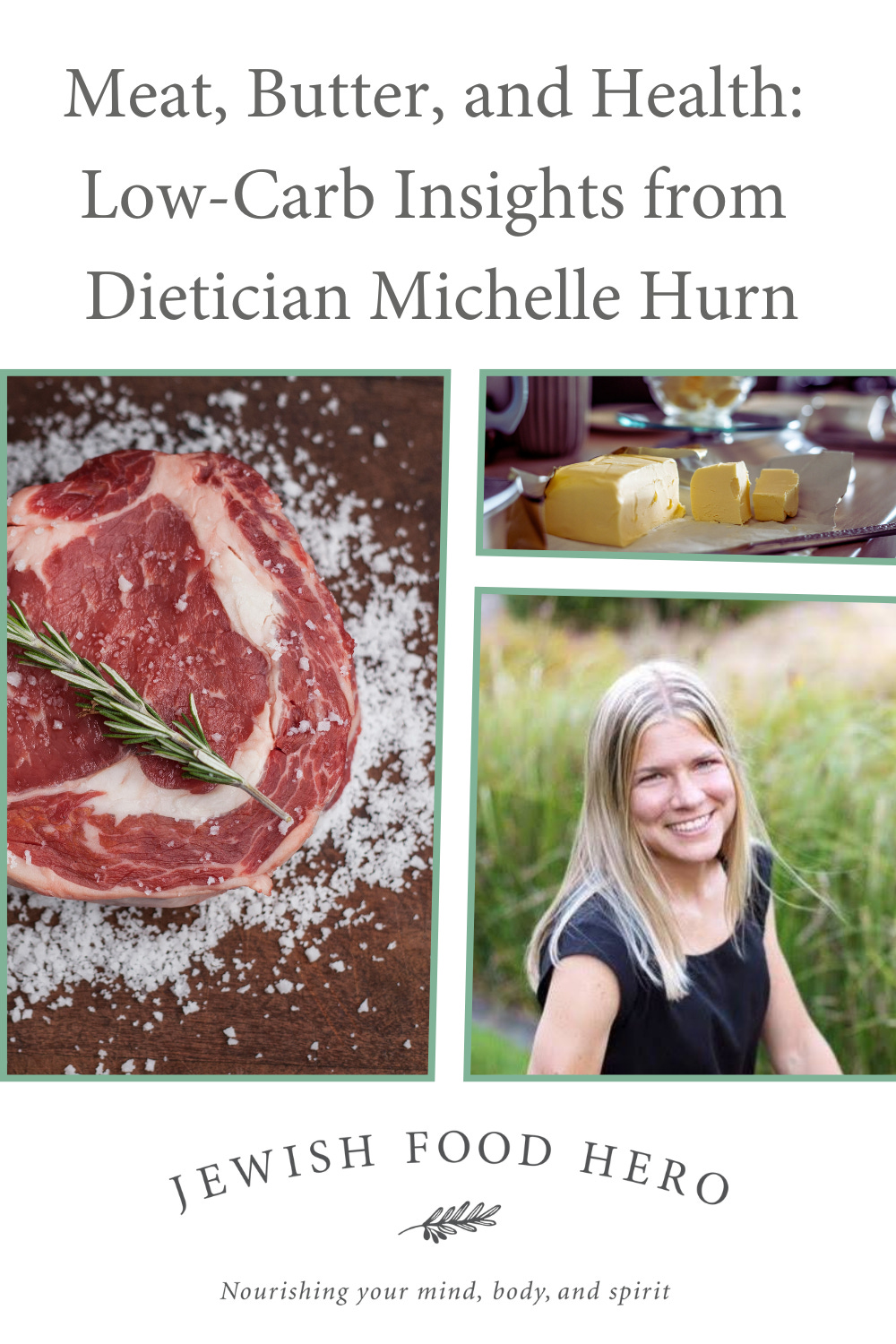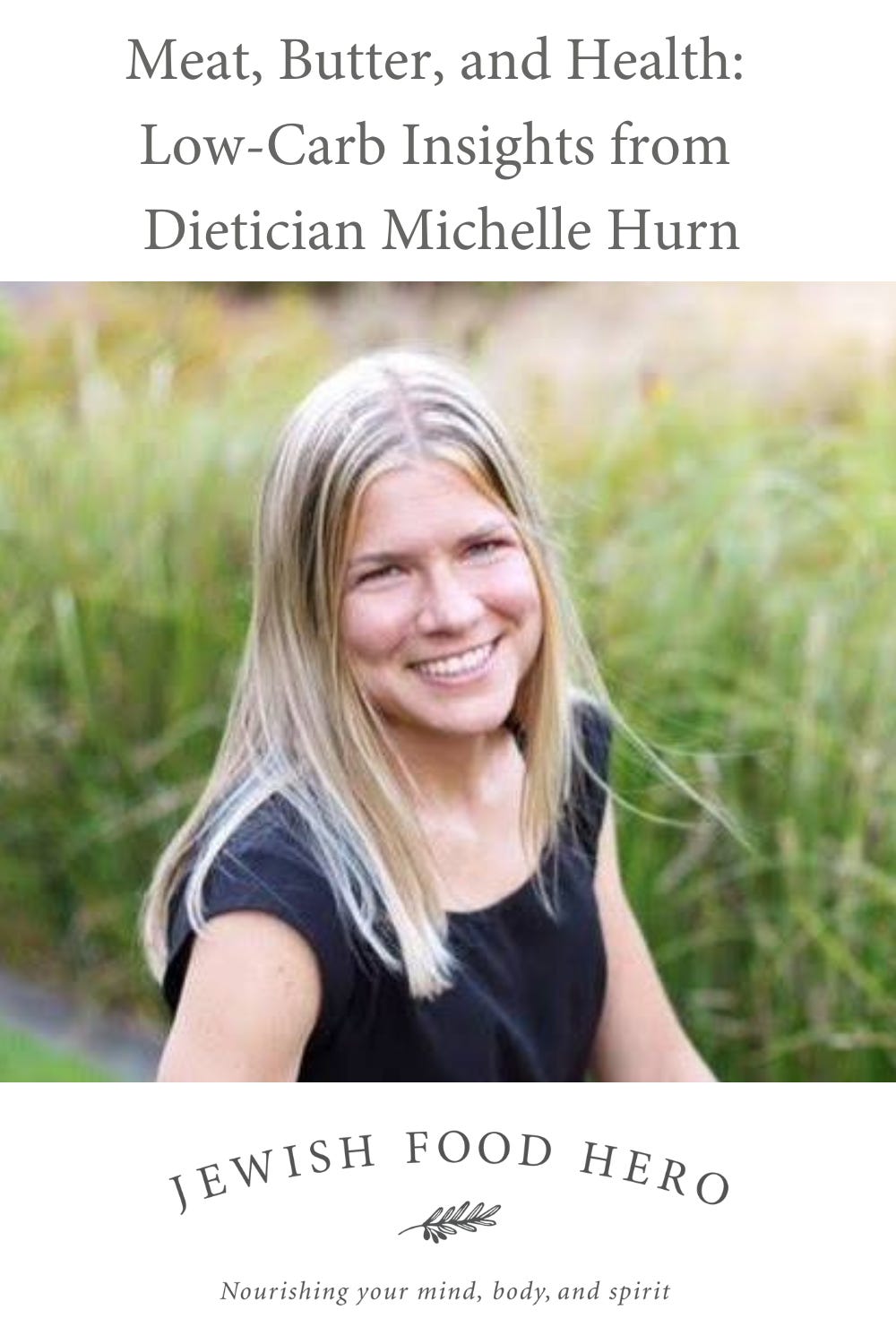Meat, Butter, and Health: Low-Carb Insights from Dietician Michelle Hurn // Part 2
Animal Protein + Fat and Women's health + our Mental Health
This is part 2 of my interview with Michelle Hurn, a registered and licensed dietitian with sixteen years of experience as a clinical, acute care dietitian, lead dietitian in psychiatric care, and outpatient dietitian.
In Part 1 of this interview, we focused on several key topics related to diet and health: whether animal protein is inflammatory, the relationship between animal protein and disease, the impact of plant-based diets on the environment, the connection between saturated fat and heart disease, the role of eating frequency in health, how diet can influence Type 2 diabetes, and effective dietary strategies for weight loss. [Read Part 1 here]
Michelle's expertise highlighted several key areas:
1. Animal Protein and Inflammation: Contrary to some claims, Michelle explained that meat is not inherently inflammatory. Instead, many studies incorrectly lump processed and unprocessed meats together. She emphasized that animal protein, when not combined with processed carbohydrates, is highly nutrient-dense and beneficial.
2. Animal Protein and Disease: Michelle discussed the misconception that animal protein leads to various diseases. She argued that hyperinsulinemia, caused by excessive carbohydrate consumption, is the real culprit behind many health issues.
3. Environmental Impact of Diets: She challenged the notion that plant-based diets are inherently better for the environment. Michelle advocated for regenerative agriculture, which uses natural animal and plant cycles to improve soil health and sequester carbon, contrasting it with the harmful effects of industrial monocropping.
4. Saturated Fat and Heart Disease: Michelle questioned the link between saturated fat and heart disease, suggesting that insulin resistance and inflammation, often due to high carbohydrate intake, are more significant contributors to heart disease.
5. Eating Frequency: Michelle debunked the myth that frequent eating boosts metabolism, recommending instead fewer, nutrient-dense meals to keep insulin levels low and promote fat burning.
6. Diet and Type 2 Diabetes: She highlighted the effectiveness of low-carb diets in managing and potentially reversing Type 2 diabetes, noting that dietary carbohydrate restriction can significantly reduce blood sugar levels and the need for medication.
7. Diet and Weight Loss: Michelle's weight loss advice mirrored her recommendations for diabetes management, advocating for a diet rich in animal proteins and healthy fats, complemented by low-carb vegetables.
Michelle's insights underscored the importance of critically evaluating conventional dietary advice and embracing whole, nutrient-dense foods for optimal health.
In Part 2 of our interview, we delve deeper into the compelling connection between what we eat and our mental well-being. Recent research highlights the significant impact of dietary choices, particularly the ketogenic diet, on various mental health disorders. Studies suggest that ketogenic diets, known for their anti-inflammatory properties and ability to stabilize blood sugar, may offer substantial benefits for conditions such as Alzheimer's disease, bipolar disorder, and anorexia. This interview explores the concept of viewing mental health disorders not just as psychiatric conditions but as metabolic-psychiatric disorders, emphasizing the importance of addressing metabolic issues for effective treatment. We will discuss how specific diets can influence mental health and the promising results from clinical trials and case studies supporting the use of ketogenic diets to improve mental health symptoms.
May we all learn from this interview with Michelle, and may it give us the courage to educate ourselves and then make changes in our own diets for improved mental and physical health.
Diet and Mental Health
There is growing evidence that diet can impact mental health. How does what we eat affect our mental well-being, and what dietary choices can support better mental health?
I am so encouraged to see ketogenic diets receive the spotlight for their role in improving mental health disorders. Currently we have studies on ketogenic diets for Alzheimer's disease, bipolar disorder, and there is an ongoing study looking at the impact of ketogenic diets for individuals struggling with anorexia.
How is it that ketogenic diets are having such a powerful impact on mental health? Ketogenic diets are anti-inflammatory, and simply stabilizing blood sugar can have a powerful impact on reducing anxiety. In my opinion, the success of the ketogenic diets for these disorders has to do with the fact that it's addressing errors in metabolism.
When it comes to mental health, we have to stop looking at mental health disorders as purely psychiatric disorders. We need to look at them as metabolic-psychiatric disorders. In my experience, if we ignore the metabolic component, the individual suffering with the disorder (whether it’s anorexia, major depression, or bipolar disorder) may continue to either relapse or be unable to live a full functioning life.
The best way to demonstrate this concept is to consider the disease epilepsy. Epilepsy is a seizure disorder. Babies are born with epilepsy. They didn’t do anything wrong! They didn’t have a bad diet. They simply were born with a metabolic abnormality in their brain. If they are fed glucose or sugar, they have seizures. If they are put on low carb, high fat diets, their brains are fueled with ketones and they stop seizing. It is suggested that individuals with mental health disorders simply do not metabolize carbohydrates in the brain well. This can cause different symptoms for different individuals. As mentioned above, several clinical trials as well as a slew of case studies are showing improvements in mental health symptoms when individuals follow a ketogenic diet.
Animal Protein, Fats, and Women's Health
How important are animal proteins and fats for women's health, particularly in terms of hormonal balance, fertility, and mental health? Can you explain the specific benefits these nutrients provide for women?
Humans were designed to eat animals. Most people have no issue acknowledging that each species has a species specific diet. Of course a tortoise eats differently than a dog! When it comes to what foods are important for humans, people have very strong opinions about this issue.
Animal based foods are incredibly dense in bioavailable nutrients. Recall the term “bioavailable” simply means absorbable. If you can't absorb the nutrition, it’s effectively useless to you. 100 grams of Spinach has 2.5 mg of iron, and 100 grams of beef has 2.5 mg of iron. The issue is that the iron in spinach is not bioavailable. Your body can only absorb about 1.7% of that iron. Your body absorbs 20% of the iron in beef. In addition to iron, animal products contain B12, B1, B6, Niacin, and folate. All of these are important for women’s health. B6 plays a role in hormonal balance and we know that folate is crucial during pregnancy to ensure the baby has a healthy brain and developed spinal cord.
Take home message: women should eat animal based foods regularly.
Regenerative Agriculture and Animal Products
Can you explain what regenerative agriculture is and how meat and dairy products can be a part of this sustainable farming practice? How does this approach benefit the environment compared to conventional agricultural methods?
When it comes to agriculture, we can all agree that we want the land and animals to be respected and treated with the greatest care. We’ve all seen images of animals in large, multinational factory farms. The conditions are horrific, the animals are suffering, and the land will be eroded and destroyed. Every human with an ounce of empathy and compassion is against cruelty to animals and destroying the land. Despite what many “anti-meat” advocates want you to think, many farmers care deeply about the health and well being of their animals.
Regenerative farming uses both plants and animals to ensure soil health. For example, White Oak Pastures in Bluffton Georgia has diverse foliage on their property, and they ensure that all animals are able to carry out normal animal functions. Animals should have room to frolic, run, peck, scratch, and roll in the mud. When an animal, like a cow, is killed every part of the animal is used. The blood is used for fertilizer, and the bones are used for stocks, soups, and for dog chews. Collagen and tendons can be ground up and used as composts, and the hides are used to make clothes and wallets.
Note that this type of agriculture is actually good for the environment as it sequesters carbon into the soil. We must actively reject misinformation demonizing all forms of animal agriculture. Instead, we can actively seek to educate ourselves and support farmers who are practicing regenerative agriculture. Our health and the health of our planet depends on it.
Three Key Dietary Changes for Better Health
If people want to make three dietary changes to feel more energized, improve their mental health, and help with weight management, what are three easy changes you propose?
Get sold on why you want to change. It’s very easy to get excited about a new way of eating or a new exercise program. Before you make any changes, really get honest with yourself! Why do you want to change? What would your life look like if you lost 50 pounds / reversed type 2 diabetes / were able to keep up with your kids? Get sold on your why first. You will need to have a deep resolve in your why and reflect on it when things become challenging or a well meaning family member tells you, “Keto is SO bad for you.”
Buy the food you like and can afford. When we first started eating a low carbohydrate diet, we bought a lot of ground beef. This way of eating does not need to be expensive or fancy. Buy what you are going to look forward to eating and can afford.
Get highly processed foods out of your house. It’s interesting how easy it is to eat junk food when it’s available. Ask your family for support in getting rid of those highly processed carbohydrates like chips, cookies, crackers and the like. Note, ideally it would be great if your family would join you in this endeavor, but they don’t have to for you to make the change. It’s smart to expect some resistance from family and friends. People are genuinely addicted to processed foods, and they have been getting terrible advice from dietitians when it comes to how humans should eat. Combine that with the fact that food is a powerful stress reliever and coping mechanism for many individuals and you’ll understand why not everyone will want to get on board with this way of eating. Do it for you!
Contact Information
If people want to reach out to you for more information or guidance, how should they do that?
Michelle offers nutrition consults or answer questions related to nutrition.
You can email Michelle at: dietitiansdilemma.hurn@gmail.com
Follow Michelle on instagram at: @RunEatMeatRepeat
Buy the Dietitian’s Dilemma: The Dietitian's Dilemma: What would you do if your health was restored by doing the opposite of everything you were taught?
Buy Michelle’s children’s book, The Fox Family Food Fight
Read Michelle’s co authored paper on Animal based diets for anorexia: Animal-based ketogenic diet puts severe anorexia nervosa into multi-year remission: A case series | Norwitz | Journal of Metabolic Health
I hope you enjoyed this interview with Michelle and it will support you in making good food choices for yourself and your family.
Am Yisrael Chai
Kenden












Enjoyed parts I and II. Thank you for this thoughtful post. And Happy Independence Day. 🇺🇸~Joan